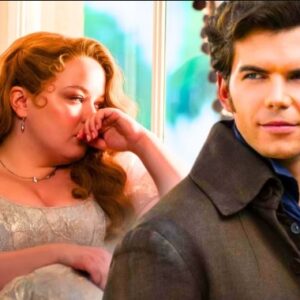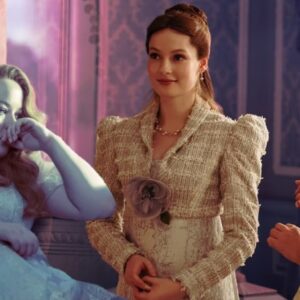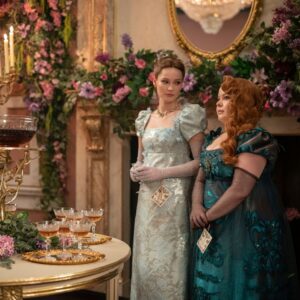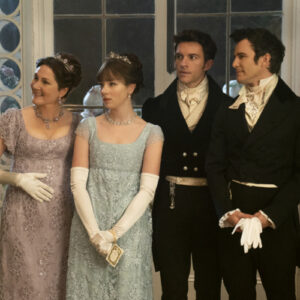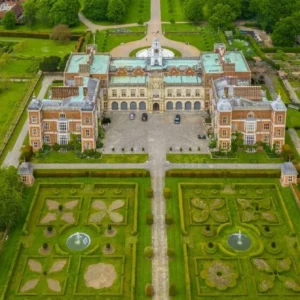Being cast as a scheming toff in the global phenomenon Bridgerton was a surprise for Claudia Jessie. Fiercely proud of her roots, the Brummie talks about etiquette lessons, getting too many tattoos and why working-class actors so often get a rough deal
The actor Claudia Jessie greets everyone – including journalists, I discover – with an almighty hug. “Hello bab,” she says as we embrace, before returning to the barista, still grinning. We’re meeting in a central Birmingham café, not far from where she lives, and Jessie is displaying the terrier enthusiasm of a kid on holiday. For two straight hours, through tough topics and all, she’s a flurry of sunshine and smiles. “Really,” she declares, “I’m just the happiest I’ve ever been, I couldn’t be happier. My life has, unequivocally, been a lot better than I thought it would be.”
It’s not hard to see why she’s flying high. Jessie is best known as Eloise Bridgerton, the fifth child of a wealthy family finding its place in high society, in Netflix’s boundary-breaking Regency-era drama. We’re here to discuss Bridgerton’s third season, which is just about to air, and in which she remains the show’s much-loved protofeminist cynic. Now 34, she has been working on-screen steadily for a decade. From 2013, leading BBC One’s police drama, WPC 56. Then her turn in ITV’s Vanity Fair miniseries, before her infamous run in season four of Line of Duty as hoity-toity PC Jodie Taylor. There have been bit-parts in The Detectorists, Call the Midwife and Doctor Who.
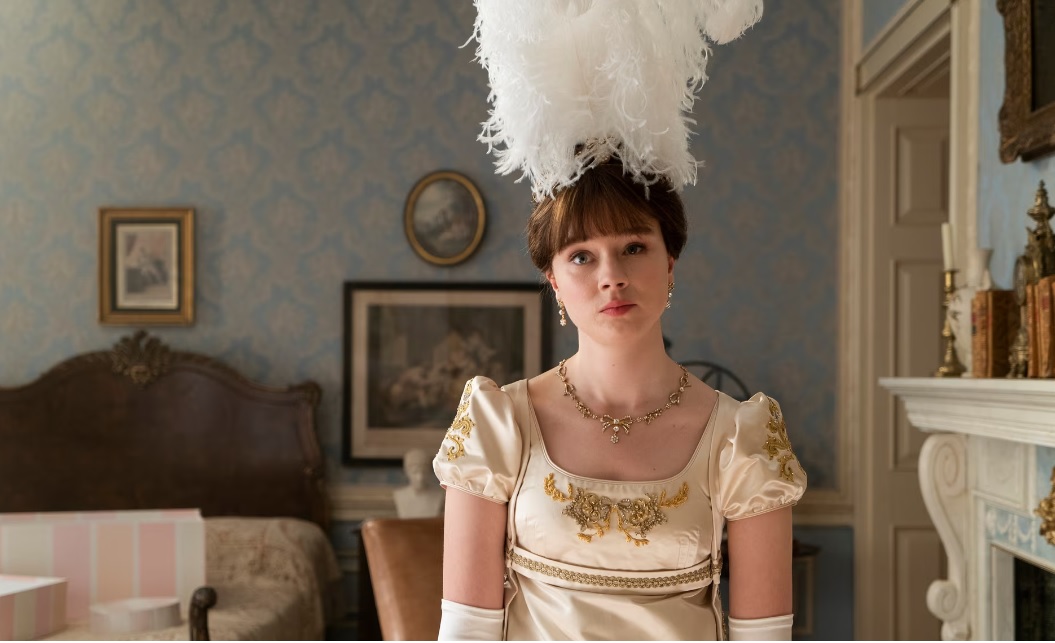
But Bridgeton is a cultural phenomenon on the biggest streaming service in the world. Getting her head around being in a global smash hit has taken some adjustment. “I do love it,” she says. “Playing Eloise means I get to support my family and friends, which I never thought I’d be able to do. But I was surprised I was cast. And I was absolutely petrified to step on set – I still get nervous. Even going back for season three, I thought I was going to be shit, that they were going to fire me. It’s something that never goes away.”
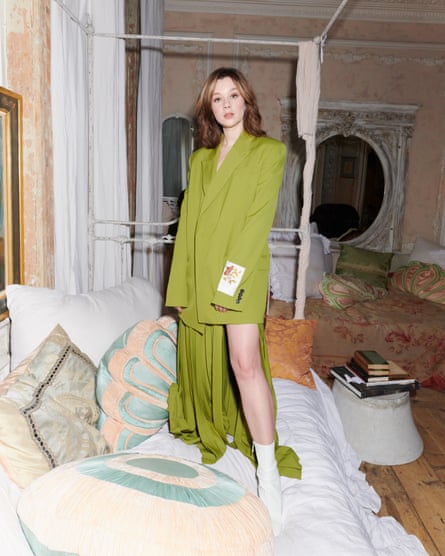
The latest season sees change in the air for Bridgerton’s lords, ladies and their court of toffs, who scandalously shag and scheme their way to the top of the social strata. As the show’s scene stealer, Jessie laughs at “being able to get away with murder” when playing Eloise: she refuses to conform to the muted, era-specific expectations of etiquette that the rest of the cast must. “She’s a modern character,” Jessie says. “We went to etiquette classes to learn how to bow and curtsy and all that shit and I was like, ‘Eloise unsubscribes from all that. I don’t care if it’s back in the day, if you’re just sitting around with your family, you’re going to slouch on the sofa.’”
It suits Jessie to revel in rejecting the trappings of aristo high-society. To a far greater degree than Eloise, she is also an outlier on Bridgerton: a working-class actor playing upper class – a rarity, she reckons, in her industry. “Sometimes, upper-class people play below as well,” she says. “They have their cake and eat it. I think Bridgerton is brilliant, because there are loads of people who wouldn’t usually be seen in those roles as a lady or a duke. When I get interviewed, I am often asked if I’d like to live in the Bridgerton world and I have to remind them that if I did I’d be staff.”
Jessie credits getting her role on the show to the fact that Bridgerton had a working-class casting editor, Cole Edwards. He later became Jessie’s partner. “And I can do a really good posh accent,” she says, “because you’re so used to hearing them growing up – imitating them is easy.” Hers was a winning audition. “I got a job and a fella on the same day,” she says, “it was a great day for me, wasn’t it?” Jessie remains slightly bemused at a remarkable, fortuitous turn of events. A future in the arts seemed unthinkable to her as a child; a future on television even more distant.
Jessie was born in Moseley in the suburbs of Birmingham and spent her childhood between London and a houseboat in Brum. “I was back and forth most of my life,” she tells me. “When my dad was still about, we spent a lot of time on the canal, but we were always on and off the boat. And I was also raised in a big old council estate in north London. It was rough. All I ever knew was things being really hard. Dad was off, Mum worked as a cleaner. It was just difficult. I’ve got good memories of Mum and my brother, but we had no money, there were bailiffs at the door, it was horrible.” More than once her brother’s schoolmates bought the family shopping because money troubles were so severe. Still, Jessie owes her mother everything. “She’s the most incredible human being and she did everything she could for all of us. One thing I’m privileged to have, no matter how little money we had, is a mum who wanted us to go for what we wanted.”
At 14, Jessie started home-schooling, after struggling with bullies. “I didn’t develop any self-confidence,” she says, “no matter how much my mum tried to instill it in me. But I knew from an early age I had the ability to make people laugh. Mum cleaned houses in exchange for my music lessons or dance classes – my only early performing experience was in the living room, doing Bruce Forsyth impressions.” But performing professionally? It never crossed young Jessie’s mind. “If you don’t come from a certain environment, if you don’t come from money and if you don’t come from a stable background, chances are you’re not going to pirouette into the living room and be like: ‘Mum, I want to be an actor.’”
Jessie was working in a pub in her late teens when she started acting classes. It was on a whim, initially. Soon she was noticed by local playwright, Hannah Phillips. “She saw in these classes that I could do it,” Jessie recalls, “but I couldn’t really afford to keep going. She believed in me, and asked me to be a part of some theatre companies she had in Birmingham. Without her, I wouldn’t be an actor. I’m eternally grateful.”
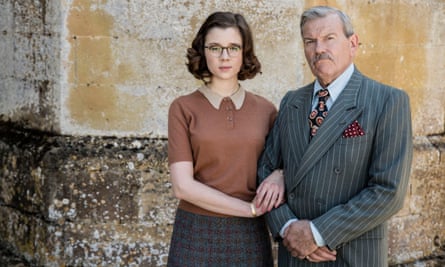
Phillips cast Jessie in a play of hers, The Fear of Queer, that ran at London’s Drill Hall Theatre. Jessie was 20 and the role became a catalyst for her career. “By that point, I’d done all the things I shouldn’t really have done as an actor,” she admits. Specifically, getting loads of tattoos, including a “ginormous” one on her back. She won’t reveal what of. Back then, her mental health was rocky: panic attacks, anxiety. Still, I say, performing in plays must have taken some self-confidence. “I just wanted to do something that wouldn’t make me feel worse,” she replies, so I thought: ‘Fuck it!’ I wanted to see if I could be happy.” It worked: on stage, Jessie found she felt at home. “Performing was when I first felt proper happiness. I was like, ‘Oh, my God, this is what this is!” Suddenly an alternative trajectory seemed possible.
At 22, she was cast in Doctors, the popular locally shot BBC medical drama. It offered Jessie a break – she landed her role on the show within six months of getting an agent. Late last year, after a run of 24 years, its cancellation was announced. “That’s a travesty for the industry,” she says, “and a travesty for the show’s working-class actors and crew.” The news came not long after the city of Birmingham announced the cutting of all arts funding following the council’s bankruptcy, something Jessie believes will only worsen class divides. “This industry is so reliant on finding finance and on knowing the right people. I don’t know how things are going to get any better, particularly for working-class people. The BBC Birmingham crew were the fucking coolest bunch of people. What do they do now?”
